
Top stories






More news














The judges said that her feature “shone a light in the cracks when most of us would prefer not to look, showing how the innocent and juveniles are thrown into holding cells and the extent of the collusion between prison gangs and warders who turn a blind eye on rape, drugs and violence that is life in prison today.”
Friedman had already won the regional finals, for which she received a R5000 prize. On Sunday she added the national finals, for which she won R10 000, as well as R100 000 for being adjudged the overall winner.
The Lifetime Achievement award was awarded posthumously to Percy Qoboza and Editors' Choice went to Sipokazi Maposa from the Cape Argus.
The annual event stands out as one of the best organised, catered and awards productions in the industry. A special musical show, developed and choreorgraphed for the annual Vodacom CEO Awards held the previous night, also entertained the media at these awards. The spellbinding dream sequence featuring Tamara Dey, Keabetswe 'KB' Motsilanyane and the Candy Girls singing, was developed by creative dirctor Kurt Wustmann, Karen Ashwin of The Event Production Company, David Bloch, Tarnia Norman and Hurgen Cornelson.
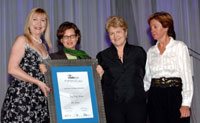
Print Feature: Tanya Farber of The Star
The judges said this category was of a high standard, and this year they had a greater number of magazine entries as well. In this respect the judges felt that one feature, published in the now defunct magazine Insig, was worthy of a special mention. It was by Willemien Brümmer, for “Bloed op die Speelgrond,” a feature on the time-bomb schools in the Western Cape face.
The winning entry, “The Bulb of Life,” was a “splendid piece of lyrical and creative writing.” This series of three articles, published on the anniversary of the Sharpeville Massacre, “executed in a highly unusual fashion, resulting in a personal story of one character and his family who would be for ever scarred by that fateful event.” The writer exhibited “a depth of understanding and the structure, style and pace made for riveting reading.”
Print News: Simpiwe Piliso of Sunday Times
The judges said the number of entries in this category almost doubled from the previous year. It was indicative, they said, not only of the confidence of the journalists wanting to compete on a certain level, but also the South African news environment in which they operate. “Over the past five years the quality of entries has increased markedly,” they said, “and in particular, the investigative nature of the entries was impressive.
“The story on the Elephant empowerment consortium's purchase of Telkom shares sparked a national outcry. This journalist was fearless in reporting the facts on what the consortium wanted to hide.”
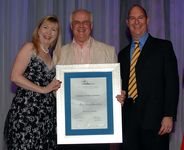
Fin/Econ: Bruce Cameron of Personal Finance, Independent Newspaper Group
The judges said the standard of entries in this category was very high. The judges had seen vast improvements in the technical proficiencies of financial journalists and their ability to relay their stories in an understandable manner. “All of the finalists presented pertinent pieces covering subjects from corruption to financial analysis, rate hikes to corporate governance. These issues affect all South Africans, from the wealthy to the poor.
“The Fidentia scandal in particular exposed how individuals and companies accumulate wealth at the expense of the poor. The ramifications of the investigations undertaken were immense.”
The winner was praised for his well-written, researched and presented reports on J Arthur Brown and Fidentia.

Sport: Carlos Amato of Soccer Life, Sunday Times
The judges said that sport journalism, like other genres of journalism, is an art. It has to do with the ability of creating a clear picture in the mind of the reader, listener or viewer who may or may not have been present at the event, or who wants to know more about an issue close to the heart.
This year's winning entry focuses on the way in which soccer players are remunerated at PSL clubs and the ongoing battle to create a fair deal for them by the SA Football Players' Union. As the journalist writes: "In a league with an income of hundred of millions a year, it's obscene that any players earn under R3000 (three thousand rand) a month." Our winning entry this year is from Carlos Amato of Soccer Life (Sunday Times).
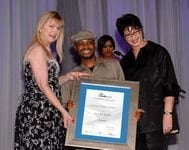
Cartoonist: Yalo, Sowetan
Cartoons provide socio-political and economic commentary in a visual way. Timing, conceptual clarity and depth of understanding of major events are important criteria. Last year we reflected once again on the tragic events of 16 June 1976 when the youth of South Africa stood up against the apartheid government. Their goal was, among other matters, to fight for freedom of choice. Thirty years on, that freedom is ever present, but not always the responsibility that goes with it. This year's winning entry strikingly juxtaposed the sad realities of 1976 and 2006. It appeared appropriately in The Sowetan on 15 June.
Television Feature: Hazel Friedman of SABC's “Special Assignment,” for her feature “For the Boys.”

The judges congratulated entrants for their creative story ideas, gripping visuals and powerful scripts. They also commended the runners-up, Charlene and Eddie Stanley, for their ground breaking story “Someone's Watching,” which showed how the technology of finding minerals has now been adapted to track down criminals as well as missing people.
The judges said the winning entry highlighted society's and the state's failure to address ongoing issues. “Beautifully conceptualised and filmed, rigorously researched and innovative in its approach, this piece is an indictment on correctional services showing how, despite attempts to curtail serial rapists in prison, there is little will on the parts of wardens or the authorities to implement change.”
Television General News: Robyn Smith of e.tv for her feature on “Rape”

The judges said the entrants provided stories beyond the expected, and honed their talent and creativity in tackling a variety of issues ranging from crime to drugs, culture, weather-change and shark attacks. The winner, however, grappled with the myriad social problems that beset the children of some working class mothers.
“This piece exposed the vulnerability of young children being exploited by the very people who should be protecting them by offering them for sex work. The news value was high, the piece technically proficient and the content well researched and gripping.”
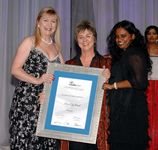
Columnist: Paddi Clay of The Herald
In print media, there are two types of columns. One makes readers laugh by writing about people's foibles, dreams and illusions. The second type is serious and mostly about political, economic or social issues. The judges said that the winner tackled her topics in a “humorous, amusing, witty and incisive manner.”
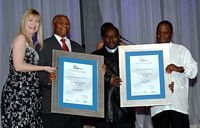
Community Media: Mandla Khwela and Sandile Nzama of Ikhwezi Radio
The judges said community media spreads the news about people who are making a difference in communities. The radio shows chronicle stories about people, progress and problems and look for unique insights or perspectives on life in communities.

Radio News: Mandy Weiner of Talk Radio 702
The tragic and shocking discovery of a mother who felt something like water flowing down her back only to find that it was her 15-month old baby's blood. The judges said that the journalist gave a “moving yet detailed accounts of the death of Khensani Mitileni in the Joburg CBD shoot-out.”
Radio Feature: Mabutho Ngcobo of Health E-News
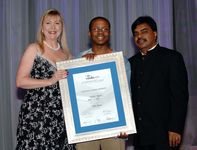
The judges said that this story on circumcision and the risk of HIV infections was not only very well researched, but it dealt with a subject that affected everyone and told in a manner that effectively drove the point home. The story relayed a “very important message for the country and was communicated in the language understood by multitudes of those at risk of getting infected by the disease.”
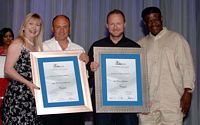
Photography: Greg Marinovich and James Oatoway, Sunday Times
The judges said the pictures submitted had been of a high quality and it had been difficult for them to come up with a winner. Two entries caught the eye because of a strong visual presentation. According to the judges, both winning entries were well-researched over a period of time and “the depth of understanding of the plight of the subjects told a visual and necessary story that we need to know and understand.”